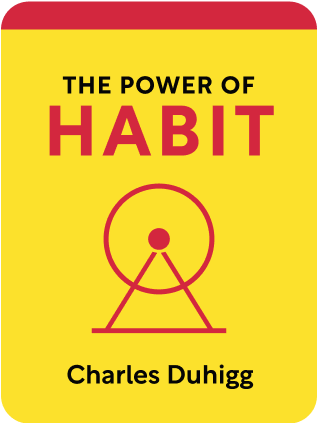

This article is an excerpt from the Shortform book guide to "The Power of Habit" by Charles Duhigg. Shortform has the world's best summaries and analyses of books you should be reading.
Like this article? Sign up for a free trial here .
What is The Power of Habit by Charles Duhigg about? How was the book received when it was released?
In The Power of Habit, Charles Duhigg explores the components of habit formation. He helps readers understand why they have certain habits, just how much these habits influence their daily lives, and how they can stop or change bad habits.
Continue below for our The Power of Habit review including intellectual context and critical reception.
The Power of Habit: Book Overview
In The Power of Habit, Pulitzer Prize-winning journalist Charles Duhigg draws on extensive research to explore how habits develop into automatic behaviors that influence personal lives, businesses, and communities. He explains why unhealthy habits are notoriously difficult to break and provides a practical framework to help you understand and change any habit.
About the Author
Charles Duhigg is a Pulitzer Prize-winning journalist, speaker, and bestselling author. He contributed to a number of award-winning series for The New York Times and currently writes for The New Yorker Magazine and other publications. He hosts the podcast How To! and has been featured on numerous TV programs including Frontline and PBS’s NewsHour. In tandem with his work as a reporter, he published his first book, The Power of Habit.
His subsequent book, Smarter Faster Better, draws on research in neuroscience, psychology, and behavioral economics to explore how to dramatically increase productivity with less effort.
Connect with Charles Duhigg:
The Book’s Publication
Publisher: Penguin Random House
The Power of Habit was published in 2012. It’s Duhigg’s most popular book—it spent more than 60 weeks on the New York Times bestseller list. It has since been translated into more than 40 languages.
Intellectual Context
Habits play an important role in our lives. That’s why people are always looking for ways to break bad habits and implement good ones. Consequently, the self-help market is saturated with books that provide productive methods for changing habits in various contexts—personal, professional, financial, creative, and so on. Some of the most popular habit-focused books include:
- Atomic Habits, James Clear: Offers a four-step process to effectively break bad habits and adopt new ones
- The Creative Habit, Twyla Tharp: Presents strategies for implementing creative pursuits into your daily routine
- High Performance Habits, Brendon Burchard: Defines the six habits you need to excel in every area of your life
- The 7 Habits of Highly Effective People, Stephen R. Covey: Discusses how to prioritize your time, focus your actions, and build relationships to achieve personal and professional success
- Tiny Habits, BJ Fogg: Demonstrates the power of applying small incremental changes to your routine to create positive improvements in your life
While the majority of books on improving habits discuss what types of habits are beneficial before walking you through specific methods and exercises to implement change, The Power of Habit takes a more theoretical approach. Duhigg argues that the more you understand the nature and influence of habits, the more power you have to change them. Therefore, instead of offering advice on which habits to implement and following up with how-to methods for changing habits, he focuses more on explaining why you rely on habits and how they influence you personally, professionally, and socially.
Critical Reception
The Power of Habit reviews are generally excellent—many reviewers comment that they’ve successfully changed their habits since reading the book. These reviewers find the case studies that Duhigg uses to illustrate his discussion well-written, highly relevant, and engaging.
However, some reviewers hold a contrasting view, commenting that the case studies are irrelevant and laborious to read. Since these studies take up the bulk of the book, these reviewers don’t appreciate having to sift through the “overly-long” examples to find the practical methods they’re searching for.
Commentary on the Book’s Approach and Organization
Each chapter in The Power of Habit focuses on the central argument that habits can be changed if you understand how they work. Duhigg draws on extensive research—academic studies and interviews with scientists and executives—to explore how habits develop into automatic behaviors that influence personal lives, businesses, and communities.
Duhigg tackles these topics in three parts: In the first part, he presents neurological research to explain how habits form and eventually turn into automatic behaviors. In the second part, he explores case studies of various companies to examine how managers can instill productive habits to transform any organization. In the third part, he illustrates how various social movements succeeded by changing ingrained social habits to influence communities and create momentum for their cause.

———End of Preview———
Like what you just read? Read the rest of the world's best book summary and analysis of Charles Duhigg's "The Power of Habit" at Shortform .
Here's what you'll find in our full The Power of Habit summary :
- The 3 steps to change your habits
- Why habits are at the root of success in football
- How social movements are just an expansion of habits from individuals to communities






